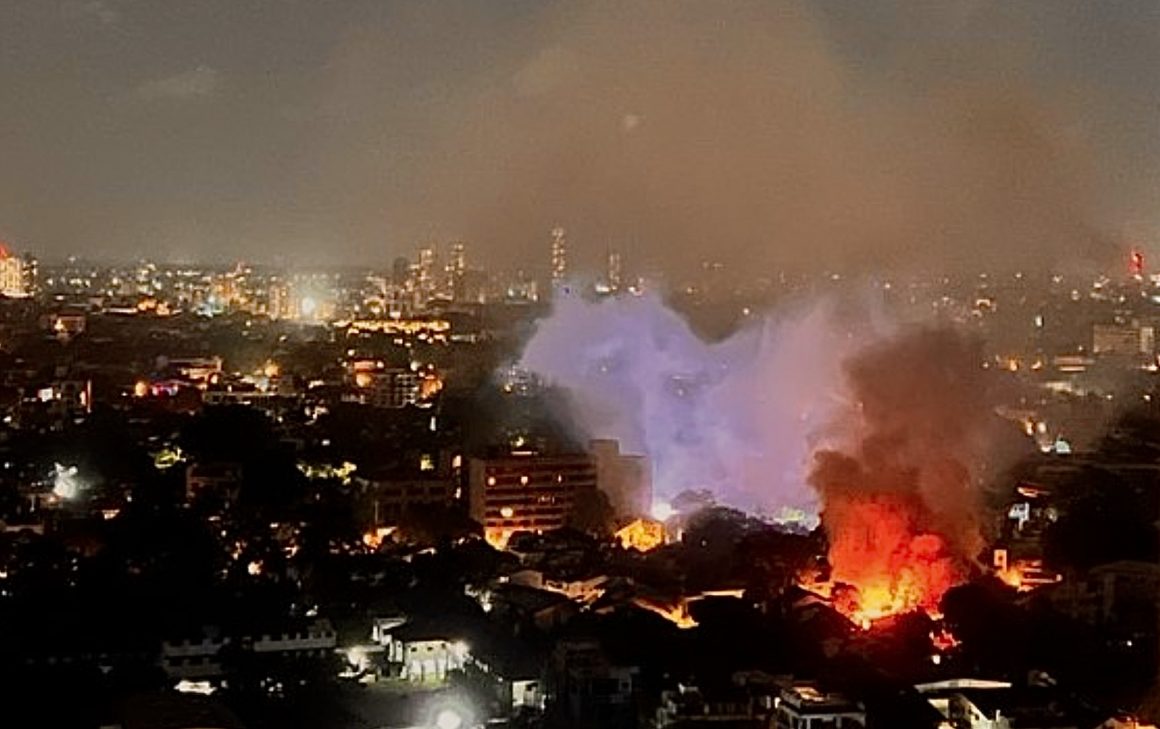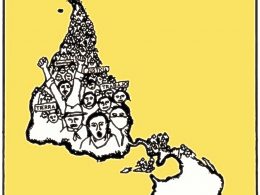As U.S. hegemony declines, capitalism’s converging crises of the pandemic, global warming, and extreme inequality are driving the countries that imperialism exploits towards collapse. And the imperialists are taking advantage of this, working to accelerate the unraveling of stability within the peripheries. They’re doing this not because this will restore the decaying neo-colonial system or Pax Americana, though they certainly try to convince themselves of this. At this stage, the most they can achieve is to sow enough chaos across the exploited world that the total transition towards multi-polarity gets delayed.
U.S. empire tries to destabilize the peripheral countries out of desperation
This strategy can stave off full multi-polarity by destroying the states within these countries before they manage to carry out China’s development plans. It’s working in Afghanistan, where Washington’s chaos-creating approach of brutal sanctions and Uyghur terrorism cultivation has deterred Chinese projects since the U.S. troop pullout a year ago. By perpetuating this kind of economic warfare and proxy warfare, the imperialists are still capable of rendering impoverished countries too unstable for China to expand the Belt and Road Initiative into their borders. There are countries that are doing relatively well at defying this destabilization scheme, like Ethiopia. But across much of Africa, southern Asia, and Latin America, Washington’s meddling remains able to at the least blunt China’s campaign to undo neo-colonial inequities.
In Myanmar, for instance, the military government has been implementing the BRI to the best of its abilities, but there’s still a civil war that Washington remains successful at keeping going. So is the case in Ethiopia, where Washington’s proxy the TPLF has carved out the zones of statelessness which Washington sees as desirable for countering China. Libya is another example; the country joined the BRI in 2018, but neo-colonial sabotage of its anti-imperialist movement’s attempts at rebuilding Libyan prosperity have kept the situation unstable. Libya will remain a powder keg for further civil conflict, and in a constant struggle to rebuild basic state functions, for as long as imperialism remains strong enough to meddle within countries like it.
This isn’t an ideal situation for the imperialists, who have been limiting their own capacity to extract from the imperial peripheries by destroying the state apparatuses of their neo-colonial regimes. But it’s preferable to a scenario where China is allowed to economically uplift the entirety of the formerly colonized world without any interference.
It’s this logic, where Washington seeks to cut its losses as a dying empire by destabilizing the neo-colonies it’s at risk of losing, which has driven this week’s U.S.-backed coup in Sri Lanka. It’s the perfect example of the process I describe, because the coup has come about directly due to a crisis that U.S. imperialism has engineered within the country. The International Monetary Fund’s predatory loans, which serve to enable exploitation by U.S. capital, destroyed Sri Lanka’s economy. When the people consequently became ripe for an uprising, the CIA co-opted this organic popular anger, and redirected it towards a color revolution with the goal of countering China. What should have been an anti-imperialist revolution was transformed into an event which reinforces imperial control.
By not substantially covering the coup, the imperialist media has allowed for it to proceed without scrutiny. But the facts dispute the narrative that it happened organically. As the demonstrators have burnt down the Prime Minister’s house, Western diplomats have praised their efforts and encouraged the government not to suppress them. The protests have been organized by imperialist NGOs and endorsed by liberal influencers, while locally their biggest promoters have been petty-bourgeois liberals rather than working class leaders.
The narrative these liberals promote is naturally not an anti-IMF one, but one that seeks to blame the “Chinese debt trap” for the economic crisis, despite China only being the source of 10% of Sri Lanka’s foreign debt. Most of this debt is held by the imperialist extraction benefactor Japan, and by Western institutions like the World Bank. The protest leaders are demanding that Sri Lanka’s economy be even further brought into neoliberal free market policies, an idea supported by the Western diplomats who these leaders have been meeting with. This development has all the signs of being a CIA operation to reverse Sri Lanka’s progress towards freeing itself from IMF influence, as further indicated by how the protesters blame Sri Lanka’s government for choosing China over the IMF.
U.S. empire’s decline continues nonetheless
Because of the extent to which imperialism’s greed and short-sightedness has accelerated capitalist collapse worldwide, this operation can’t feasibly make Sri Lanka back into a full U.S. neo-colony. The country’s people, who aren’t represented by these privileged liberal opportunists which have collaborated with imperialism, have been too ravaged by neoliberal exploitation to let this exploitation get worse. At least in the long term. Should the imperialists succeed at forcing through additional liberalization measures, the people will at some point meet their puppet regime with a new uprising, one that’s truly led by the proletariat.
The project for redoubled hyper-capitalist shock therapy in Sri Lanka isn’t sustainable, like neo-colonialism was ever a sustainable project in the first place. It’s an effort to maintain colonialism’s pillage, one that’s had to become ever-more intense in its subjugation as capitalist collapse has prompted neoliberal reforms. Its logical conclusion is for the imperial peripheries to shake off the parasitic influence of the core countries. And if this doesn’t happen in Sri Lanka through a peaceful transition towards Chinese-led development, it will happen through a violent uprising by the abused masses. At least should the neo-colonial regime exhaust all peaceful means for proletarian liberation, and provoke guerrilla warfare.
So will be the case in the other places that imperialism has been sowing chaos within to prevent them from becoming anti-imperialist countries. What we need to understand about Washington’s destabilization operations is that like Washington’s ever-expanding sanctions, they’re not a sign of resurgent U.S. power, but an admittance of defeat by a floundering empire. Both of these types of warfare are reactive, carried out to spite the rest of the world for turning against imperialism. They’re futile in reversing the process towards multi-polarity, or in negating the growing crises which capitalism is creating for itself. All they can do is frustrate the global liberation struggle, not eliminate the historical trends which are inevitably strengthening it.
As Mao said, U.S. imperialism is at the same time a real tiger and a paper tiger, both able to inflict great damage and vulnerable to the forces of class and national liberation struggle. The imperialists are currently able to frustrate these struggles throughout much of the globe, but their grip is weakening, as indicated by the failure of their attempt to use Ukraine to destabilize Russia, their attempt to use Xinjiang to destabilize China, and the consistent failure of their recent coup attempts within anti-imperialist countries. They’ve only succeeded at collapsing Sri Lanka because it was already in the throes of U.S. economic influence, and therefore easy to bring to its knees. Imperialism absolutely has the potential to lose its grip over Sri Lanka and the rest of the imperial peripheries. The important question is whether the global class struggle will prove successful enough to combat imperialism in a swift fashion, to the extent that Washington can’t do too much further harm.
We in the imperial center must recognize that this demand for mobilization applies to us just as much as to those within the peripheries. We can’t win our class struggle without help from the working classes of the neo-colonies, who are weakening the capital of the core countries by depriving imperialism of its extractive potential. But the people within the most vulnerable countries, like Libya, likely won’t even be able to build any functioning workers states as long as the U.S. is here to spread its destruction. For this reason, in their denunciation from this year of U.S. imperialism’s crimes, Pan-African News Wire concluded by calling for Americans to do our own part in the effort to defeat imperialism:
The uncertainty generated by the war in Ukraine on an international scale could very well result in a similar and perhaps more costly defeat for U.S. foreign policy. This coupled with the lack of a social spending strategy absent of legislative action by Congress could doom the second half of the Biden administration to a paralyzing gridlock positioning the Republican Right for a resurgence of dominance along with the potential for a second Trump presidency. Working and oppressed people in the U.S. are compelled to unite on an independent basis to end the war drive of the ruling class and its surrogates in the political superstructure. The actual impediments to the realization of a just and equitable society in the U.S. are not to be found in Moscow, Beijing and Tehran. These U.S.-based class enemies of the majority domestically and globally have a vested interests in maintaining the Pentagon-NATO budget to facilitate the continuing exploitation of the peoples of the world.
Be vigilant of the deceptions that imperialism is using to try to carry out its machinations, and work to build international solidarity. This is how we’ll defeat the imperialists, who are aiming to expand their engineered collapse of Sri Lanka into other places. The signs of this reflecting a broader strategy are obvious, such as the imperialist Wall Street Journal’s headline: “Sri Lanka Crisis Flashes Warning for Other Indebted Economies.” This may as well be interpreted as a threat. The debt the Journal talks about is coming from the U.S. bloc’s neo-colonialism, not from China. And this debt is now serving as a weapon in imperialism’s attempts to wage a constantly expanding war against the Global South.
—————————————————————————
If you appreciate my work, I hope you become a one-time or regular donor to my Patreon account. Like most of us, I’m feeling the economic pinch during late-stage capitalism, and I need money to keep fighting for a new system that works for all of us. Go to my Patreon here.








